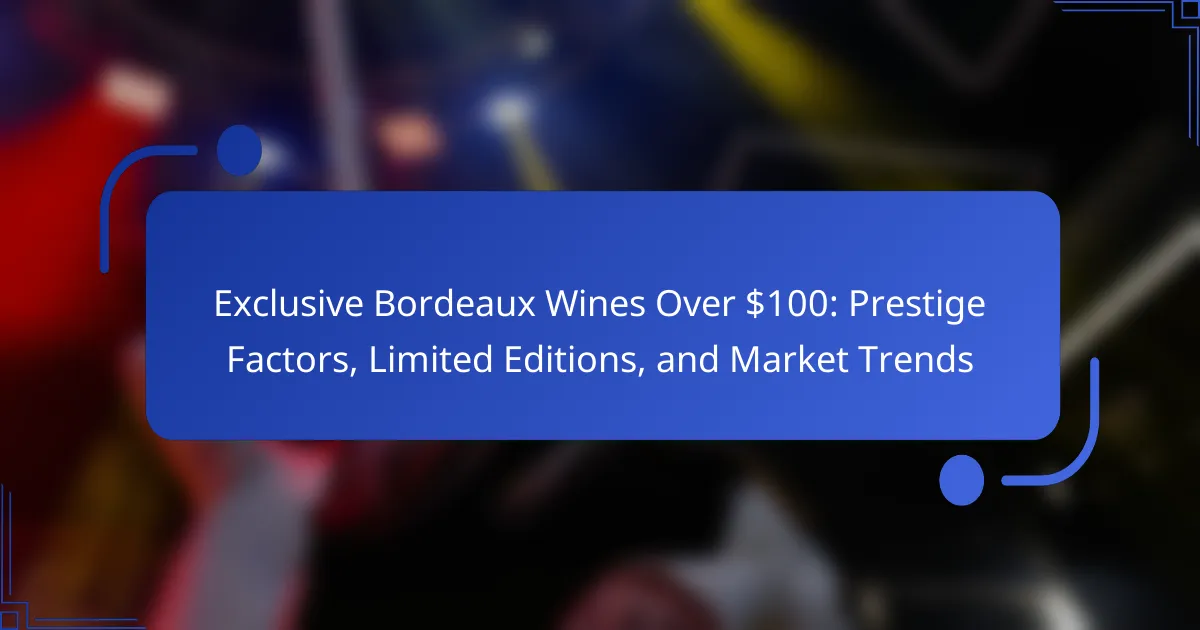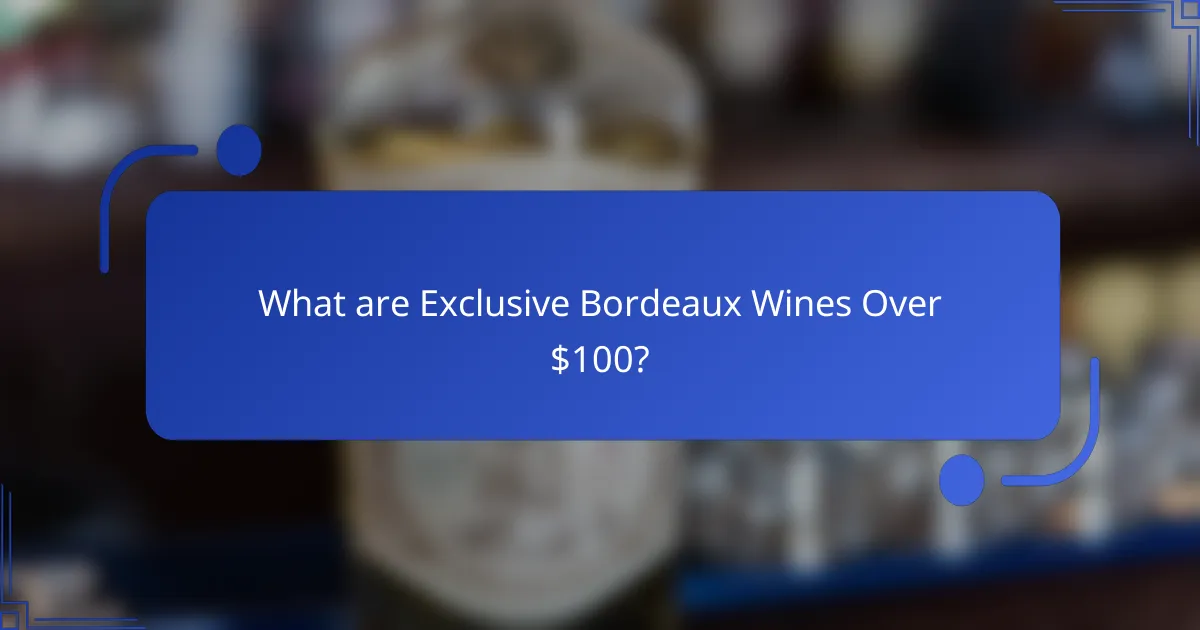
What are Exclusive Bordeaux Wines Over $100?
Exclusive Bordeaux wines over $100 are premium wines from the Bordeaux region, known for their exceptional quality and aging potential. These wines often come from prestigious châteaux, such as Château Lafite Rothschild or Château Margaux. They typically feature varietals like Cabernet Sauvignon, Merlot, and Cabernet Franc. The price reflects factors such as limited production, high demand, and critical acclaim. For instance, the 2015 Château Haut-Brion is priced over $100 due to its exceptional vintage rating of 98 points by Wine Advocate. Such wines are sought after by collectors and investors, contributing to their exclusivity and market value.
Why are Bordeaux Wines considered exclusive?
Bordeaux wines are considered exclusive due to their prestigious reputation and limited production. The Bordeaux region in France is renowned for its high-quality vineyards and strict regulations. Only a small percentage of wines from Bordeaux can command prices over $100. This exclusivity is driven by factors such as the terroir, grape varieties, and winemaking traditions that are unique to the region. Additionally, the historical significance of Bordeaux wines contributes to their allure. The classification system, which includes prestigious châteaux, further elevates their status. Limited editions and vintage releases create scarcity, enhancing demand among collectors. These elements collectively establish Bordeaux wines as symbols of luxury and exclusivity in the wine market.
What factors contribute to the exclusivity of Bordeaux Wines?
Bordeaux wines are exclusive due to their limited production, prestigious regions, and historical significance. The Bordeaux region has a reputation for high-quality wine, contributing to its desirability. Strict regulations govern vineyard practices, which limit the quantity of wine produced. Additionally, many Bordeaux wines come from classified estates, enhancing their prestige. The aging potential of these wines also increases their value. Limited editions and rare vintages further drive exclusivity. High demand from collectors and investors adds to their market value. These factors collectively ensure that Bordeaux wines maintain a status of exclusivity.
How does price influence the perception of exclusivity in Bordeaux Wines?
Price significantly influences the perception of exclusivity in Bordeaux wines. Higher prices often create a sense of rarity and desirability. Bordeaux wines priced over $100 are typically viewed as premium products. This is due to their limited production and high-quality craftsmanship. Consumers associate higher costs with superior taste and prestige. Research shows that wines above this price point are often marketed as luxury items. For example, the Bordeaux 2019 vintage saw prices increase due to its limited availability. This price elevation enhances the perceived value and exclusivity among consumers. Thus, price serves as a key indicator of quality and status in the Bordeaux wine market.
What defines the price point of over $100 for Bordeaux Wines?
The price point of over $100 for Bordeaux wines is defined by several key factors. First, the quality of the grapes used significantly influences price. Bordeaux wines often come from prestigious vineyards known for their exceptional terroir. Second, the winemaking process plays a crucial role. Techniques such as barrel aging and blending enhance the wine’s complexity and flavor profile. Third, limited production increases scarcity, driving up demand and price. Fourth, brand reputation contributes to pricing. Renowned châteaux command higher prices due to their history and accolades. Lastly, market trends and consumer perceptions affect pricing. The luxury wine market often sees Bordeaux wines as status symbols, further elevating their price. These factors collectively establish the price point of over $100 for Bordeaux wines.
What characteristics of Bordeaux Wines justify their high prices?
Bordeaux wines command high prices due to their unique terroir, aging potential, and historical significance. The terroir of Bordeaux, which includes specific soil types and microclimates, contributes to the distinct flavor profiles of its wines. The region’s climate allows for optimal grape ripening, enhancing the quality of the wine. Bordeaux wines are known for their aging potential, with many high-end bottles improving over decades. This longevity adds to their desirability and market value. Additionally, Bordeaux has a rich history of winemaking, with prestigious châteaux like Château Lafite Rothschild and Château Margaux, which have established a reputation for excellence. Limited production and exclusivity further drive up prices, as certain vintages are produced in small quantities. The demand for Bordeaux wines among collectors and investors also elevates their market value.
How does the vintage affect the pricing of Bordeaux Wines?
The vintage significantly affects the pricing of Bordeaux wines. Each vintage reflects the quality of the grapes harvested in that year. Factors like weather conditions and vineyard management influence grape quality. Exceptional vintages, such as 2005 or 2010, often command higher prices. In contrast, lesser vintages may lead to lower pricing. Historical sales data shows that top vintages appreciate more in value over time. Collectors and investors prioritize vintages for their investment potential. Thus, vintage acts as a key determinant in the market value of Bordeaux wines.
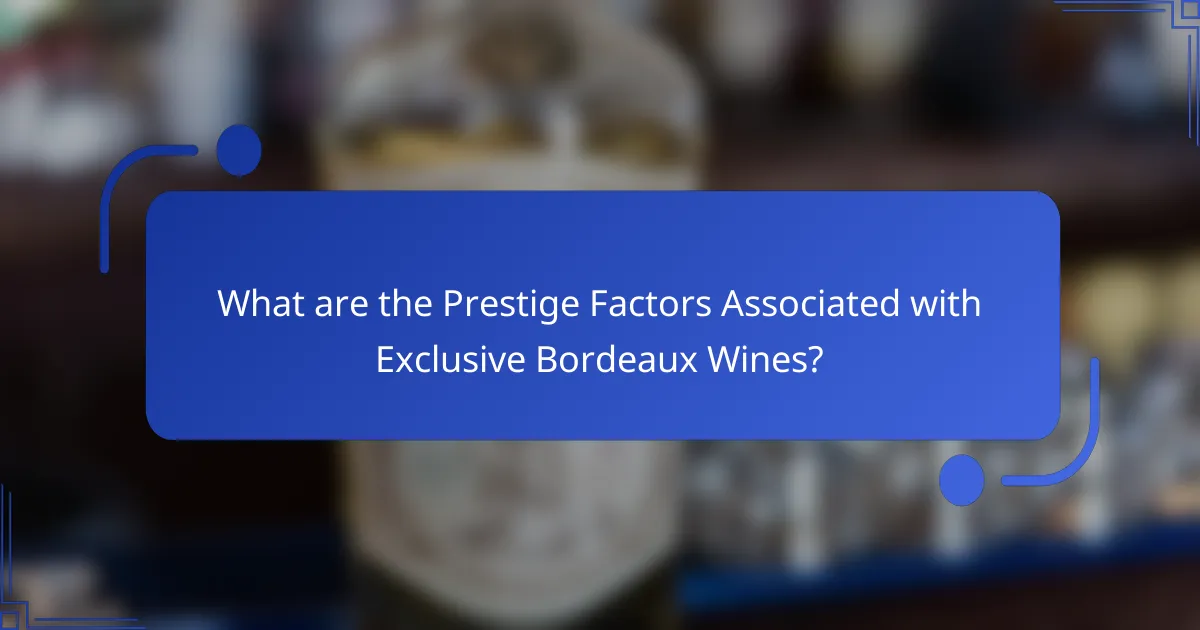
What are the Prestige Factors Associated with Exclusive Bordeaux Wines?
Exclusive Bordeaux wines are associated with several prestige factors. These factors include historical significance, vineyard reputation, and limited production. Renowned châteaux such as Château Margaux and Château Lafite Rothschild enhance prestige through their legacy. The classification system, established in 1855, further elevates the status of these wines. High demand and limited availability contribute to their exclusivity. Additionally, critical acclaim from wine experts boosts their desirability. Pricing often reflects these prestige factors, with many bottles exceeding $100. Collectors and investors view these wines as status symbols, reinforcing their prestigious image.
How does terroir influence the prestige of Bordeaux Wines?
Terroir significantly influences the prestige of Bordeaux wines. Terroir encompasses the unique environmental conditions, soil types, and climate of a specific vineyard. Bordeaux’s diverse terroirs contribute to the distinct flavors and characteristics of its wines. This complexity enhances the perceived quality and uniqueness of Bordeaux wines. Renowned regions like Médoc and Saint-Émilion are celebrated for their exceptional terroirs. The classification system in Bordeaux highlights wines from superior terroirs, further elevating their status. Historical significance also plays a role; many prestigious Bordeaux wines have roots in specific terroirs. Collectively, these factors establish a strong connection between terroir and the prestige of Bordeaux wines.
What role does the vineyard’s location play in wine quality?
The vineyard’s location significantly impacts wine quality. Factors such as climate, soil type, and topography contribute to the grape-growing conditions. For instance, Bordeaux’s maritime climate moderates temperatures, promoting balanced ripening. Specific soil types, like gravel and clay, enhance drainage and nutrient availability. The proximity to bodies of water can also influence temperature stability. Historical data shows that vineyards in optimal locations consistently produce higher-rated wines. The terroir, or the unique environmental conditions of a vineyard, is crucial in defining the wine’s characteristics. These elements combine to create distinct flavor profiles and complexities in the wine.
How do climate and soil contribute to the prestige of Bordeaux Wines?
The climate and soil of Bordeaux significantly enhance the prestige of Bordeaux wines. The region’s temperate maritime climate provides ideal conditions for grape growing. It features warm summers and mild winters, which aid in the ripening of grapes. Bordeaux benefits from the influence of the Atlantic Ocean, moderating temperatures and providing essential rainfall.
The diverse soil types in Bordeaux, including gravel, clay, and limestone, contribute to the unique flavor profiles of the wines. Gravel soils, particularly in the Médoc, promote excellent drainage and heat retention, ideal for Cabernet Sauvignon. Clay soils, found in areas like Saint-Émilion, retain moisture, benefiting Merlot grapes.
These climatic and soil characteristics have been recognized for centuries. Bordeaux wines consistently achieve high ratings from critics and collectors, reinforcing their prestigious status. The combination of favorable climate and diverse soils creates a terroir that is unmatched, making Bordeaux wines sought after worldwide.
What are the key producers of high-end Bordeaux Wines?
Key producers of high-end Bordeaux wines include Château Lafite Rothschild, Château Margaux, and Château Latour. Château Lafite Rothschild is renowned for its exceptional quality and historic significance. Château Margaux is famous for its elegance and complexity. Château Latour is known for its powerful and long-lived wines. Other notable producers are Château Haut-Brion and Château Mouton Rothschild, both recognized for their unique characteristics. These producers consistently receive high ratings from wine critics and collectors. Their wines often command prices over $100 due to their prestigious reputation and limited availability.
Which châteaux are renowned for their exclusive offerings?
Châteaux renowned for their exclusive offerings include Château Lafite Rothschild, Château Margaux, and Château Mouton Rothschild. These châteaux are known for producing some of the most prestigious Bordeaux wines. Château Lafite Rothschild is celebrated for its exceptional Cabernet Sauvignon blends. Château Margaux offers elegant wines with complex aromas and flavors. Château Mouton Rothschild is famous for its artistic labels and high-quality vintages. Each château typically releases limited editions that command high prices, often exceeding $100. Their exclusivity is further enhanced by historical significance and accolades from wine critics.
How do winemaking techniques affect the prestige of Bordeaux Wines?
Winemaking techniques significantly influence the prestige of Bordeaux Wines. Techniques such as meticulous vineyard management enhance grape quality. Precision in fermentation and aging processes contributes to the wine’s complexity. The use of oak barrels for aging adds depth and flavor. Traditional methods, like hand harvesting, signal quality and craftsmanship. These practices are often linked to renowned châteaux, elevating their status. Bordeaux wines often command higher prices due to these premium techniques. Consequently, the reputation of Bordeaux as a luxury wine region is reinforced through these practices.
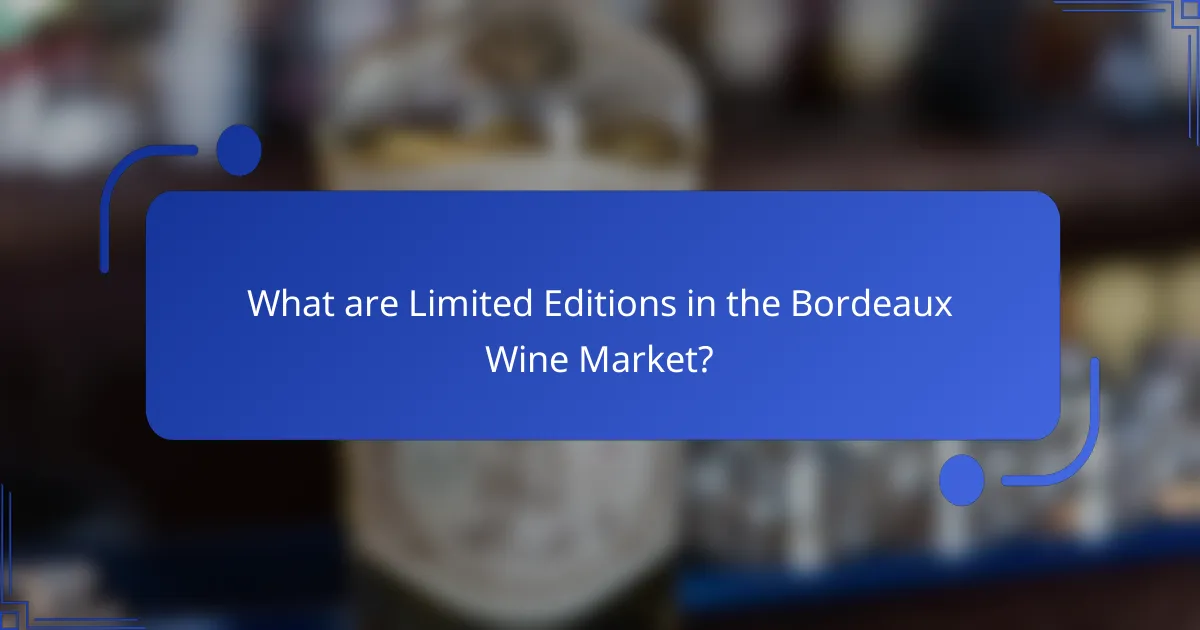
What are Limited Editions in the Bordeaux Wine Market?
Limited Editions in the Bordeaux wine market refer to exclusive wine releases that are produced in small quantities. These editions often highlight unique characteristics or exceptional quality. Limited Editions are typically associated with prestigious vineyards and renowned vintages. They may feature specific blends, rare grape varieties, or distinctive aging processes. These wines are sought after by collectors and connoisseurs. The scarcity of Limited Editions enhances their value and desirability. Historical examples include iconic Bordeaux estates like Château Lafite Rothschild and Château Margaux releasing special cuvées. Their limited availability often leads to higher prices in the market.
What constitutes a limited edition Bordeaux Wine?
A limited edition Bordeaux wine is defined by its restricted production volume. Typically, these wines are produced in small quantities, often reflecting a specific vintage or unique blend. Limited editions often come from prestigious vineyards known for their exceptional quality. They are usually bottled with special labeling or packaging to signify their exclusivity. The wines may also feature unique attributes, such as aging potential or specific varietals. Limited edition Bordeaux wines are often sought after by collectors and connoisseurs. Their rarity can lead to increased market value over time. Historical examples include renowned châteaux releasing limited runs during exceptional years.
How are limited editions produced and marketed?
Limited editions are produced through a controlled process that emphasizes scarcity and exclusivity. Producers often select a specific vineyard block or vintage to create a unique wine. This selection is based on the quality of the grapes and the desired characteristics of the final product. Limited editions are typically bottled in smaller quantities compared to standard releases.
Marketing strategies for limited editions focus on highlighting their unique attributes. Producers often use storytelling to convey the heritage and craftsmanship behind each bottle. Exclusive events, tastings, and partnerships with luxury brands enhance visibility. Social media campaigns and targeted advertising reach affluent consumers interested in exclusive offerings.
According to a report by Wine Intelligence, limited editions can command prices significantly higher than regular wines, appealing to collectors and connoisseurs. This premium positioning reinforces their desirability in the market.
What impact do limited editions have on collector interest?
Limited editions significantly increase collector interest. These exclusive releases create a sense of rarity and urgency among collectors. The perception of scarcity drives demand, often leading to higher market values. Collectors are motivated by the desire to own unique items that few others possess. Limited editions often come with special packaging or features, enhancing their appeal. Historical data shows that limited edition wines can appreciate in value more rapidly than regular releases. For example, certain Bordeaux wines have seen price increases of over 30% shortly after release. This trend highlights the strong correlation between limited editions and collector enthusiasm.
Why are limited edition Bordeaux Wines highly sought after?
Limited edition Bordeaux wines are highly sought after due to their rarity and prestige. These wines often come from exceptional vintages or renowned vineyards. Their limited availability creates a sense of exclusivity among collectors and enthusiasts. Additionally, limited editions often feature unique packaging or special labeling, enhancing their appeal. The historical significance of certain Bordeaux estates adds to their desirability. Many collectors view these wines as investment opportunities, anticipating future value appreciation. Market trends indicate that limited edition Bordeaux wines consistently command higher prices at auctions. This combination of factors drives demand and increases their market value.
What factors drive demand for limited edition wines?
Limited edition wines are driven by factors such as rarity, perceived quality, and brand prestige. Rarity increases desirability due to limited availability. Consumers often associate limited editions with higher quality and craftsmanship. Brand reputation significantly influences purchasing decisions. Wine collectors and enthusiasts seek unique offerings to enhance their collections. Marketing strategies, including storytelling and exclusivity, also play a crucial role. For example, wineries often highlight the unique vineyard conditions or the winemaker’s expertise. According to a study by the Wine Market Council, limited edition wines often command higher prices, reflecting their perceived value among consumers.
How does scarcity influence the value of limited edition Bordeaux Wines?
Scarcity significantly increases the value of limited edition Bordeaux wines. When a wine is produced in limited quantities, its availability becomes restricted. This rarity creates a sense of exclusivity among collectors and enthusiasts. As demand rises, prices often reflect this heightened interest. Historical examples show that sought-after vintages can appreciate significantly over time. For instance, certain Bordeaux wines have seen price increases of over 200% within a decade. This trend is driven by the perception that limited editions offer unique qualities. Consequently, scarcity becomes a key factor in determining market value.
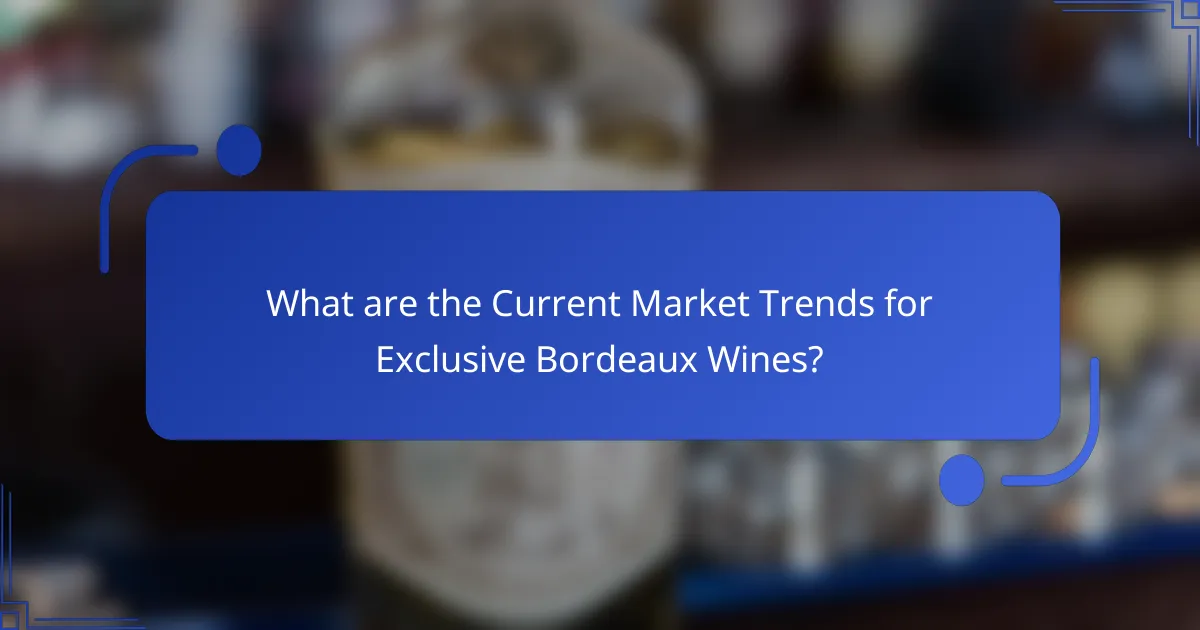
What are the Current Market Trends for Exclusive Bordeaux Wines?
Current market trends for exclusive Bordeaux wines indicate a rising demand and increasing prices. The global luxury wine market is expanding, with Bordeaux wines being a significant segment. In 2022, Bordeaux wine exports reached a value of €2.3 billion, reflecting a 20% increase from the previous year. Limited editions and prestigious labels are particularly sought after, driving collectors and investors to acquire these wines. The trend towards sustainable viticulture is also gaining traction, with many producers adopting organic and biodynamic practices. Additionally, younger consumers are showing interest in Bordeaux wines, shifting traditional market demographics. Overall, the market is characterized by an emphasis on quality, rarity, and sustainable practices.
How has the market for Bordeaux Wines evolved in recent years?
The market for Bordeaux wines has seen significant changes in recent years. There has been a notable increase in demand for high-end Bordeaux wines, particularly those priced over $100. This trend is driven by a growing interest among collectors and investors in exclusive vintages. In 2021, Bordeaux wine sales rose by 25% compared to the previous year, highlighting this surge in popularity. Additionally, limited editions and prestigious labels have become more sought after, contributing to higher prices. The emergence of online platforms has also facilitated access to these wines, expanding their market reach. Overall, the Bordeaux wine market is evolving towards a more premium and exclusive segment, reflecting changing consumer preferences.
What trends are emerging in consumer preferences for Bordeaux Wines?
Consumers are increasingly favoring premium Bordeaux wines priced over $100. This shift reflects a growing appreciation for quality and exclusivity. Many buyers are seeking limited editions and prestigious labels. Notably, there is a rising demand for organic and biodynamic Bordeaux wines. Additionally, younger consumers are becoming more influential in the market. They prioritize sustainable practices and unique flavor profiles. Recent surveys show that 60% of wine enthusiasts prefer wines with a story or heritage. This trend emphasizes the importance of provenance in consumer choices.
How do economic factors affect the Bordeaux wine market?
Economic factors significantly impact the Bordeaux wine market. Changes in consumer income levels influence purchasing power for luxury wines. For instance, during economic downturns, sales of exclusive Bordeaux wines may decline. Conversely, in a thriving economy, demand for high-end wines typically increases. Currency fluctuations also affect international sales. A stronger euro can make Bordeaux wines more expensive for foreign buyers. Additionally, interest rates influence investment in wine as an asset. Lower interest rates often lead to increased spending on luxury items, including wine. Supply chain costs, driven by economic conditions, can also affect wine pricing. Ultimately, these economic dynamics shape the overall market for Bordeaux wines over $100.
What are the future predictions for the Bordeaux wine market?
The Bordeaux wine market is expected to see continued growth in the coming years. Factors such as increasing global demand and limited production will drive prices higher. The trend towards premiumization will further enhance the appeal of Bordeaux wines priced over $100. Additionally, emerging markets in Asia are showing a growing interest in luxury wines. Historical data indicates that Bordeaux wines have consistently appreciated in value, reinforcing their investment potential. Climate change may impact future production, adding an element of scarcity. Overall, the Bordeaux wine market is poised for a robust future, driven by both demand and exclusivity.
How might changing demographics impact Bordeaux wine sales?
Changing demographics can significantly impact Bordeaux wine sales. Younger consumers are increasingly interested in premium wines. This shift may lead to a decline in traditional Bordeaux sales among older demographics. Additionally, diverse cultural backgrounds influence wine preferences. Emerging markets show a growing appreciation for Bordeaux wines. According to a 2022 report by Vinexpo, sales in Asia increased by 35% in the past five years. These trends suggest that adapting marketing strategies to target younger and more diverse consumers could enhance Bordeaux wine sales.
What innovations are being introduced in the Bordeaux wine industry?
The Bordeaux wine industry is introducing innovations such as precision viticulture and sustainable practices. Precision viticulture utilizes technology like drones and sensors to monitor vineyard conditions. This approach allows for tailored interventions that enhance grape quality. Sustainable practices include organic and biodynamic farming methods. These methods aim to reduce chemical use and promote biodiversity. Additionally, wineries are adopting advanced fermentation techniques. These techniques improve flavor extraction and consistency in wine production. The industry is also exploring new aging methods, including the use of alternative barrels. These innovations reflect a commitment to quality and environmental responsibility.
What tips should collectors consider when investing in Exclusive Bordeaux Wines?
Collectors should focus on provenance when investing in Exclusive Bordeaux Wines. Provenance ensures the wine’s history is documented and authentic. Research the vineyard’s reputation and the vintage’s critical acclaim. Understanding market trends is crucial; certain vintages appreciate faster than others. Consider storage conditions, as proper aging enhances value. Diversifying your collection can mitigate risks associated with market fluctuations. Engage with reputable wine merchants or auction houses for guidance. Lastly, staying informed about wine ratings and expert reviews can influence investment decisions.
Exclusive Bordeaux wines over $100 represent premium offerings from the Bordeaux region, characterized by their exceptional quality, limited production, and high demand. The article examines the prestige factors that contribute to their exclusivity, including historical significance and renowned producers like Château Lafite Rothschild and Château Margaux. It delves into the impact of pricing on consumer perception and explores the characteristics that justify the high costs, as well as the trends in the current market, including the rising interest in limited editions and sustainable practices among younger consumers. Additionally, the article provides insights into the evolving landscape of Bordeaux wine sales, driven by changing demographics and innovative practices in viticulture.
